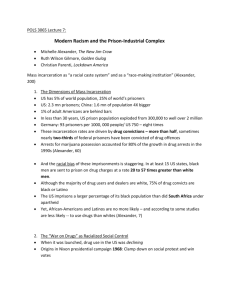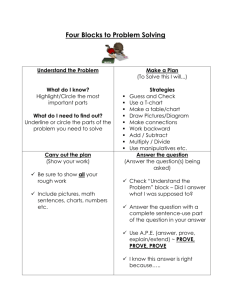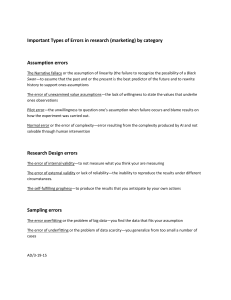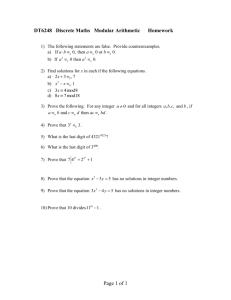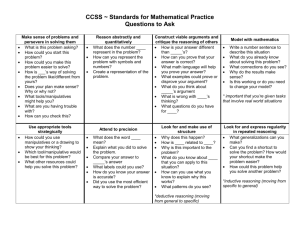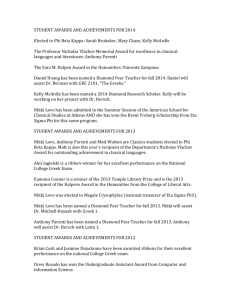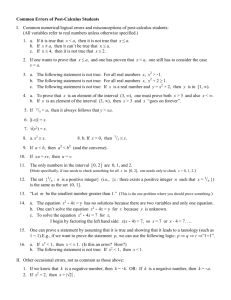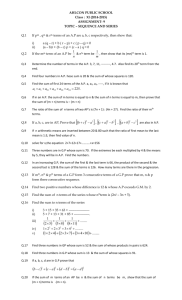Parenti Assumptions
advertisement
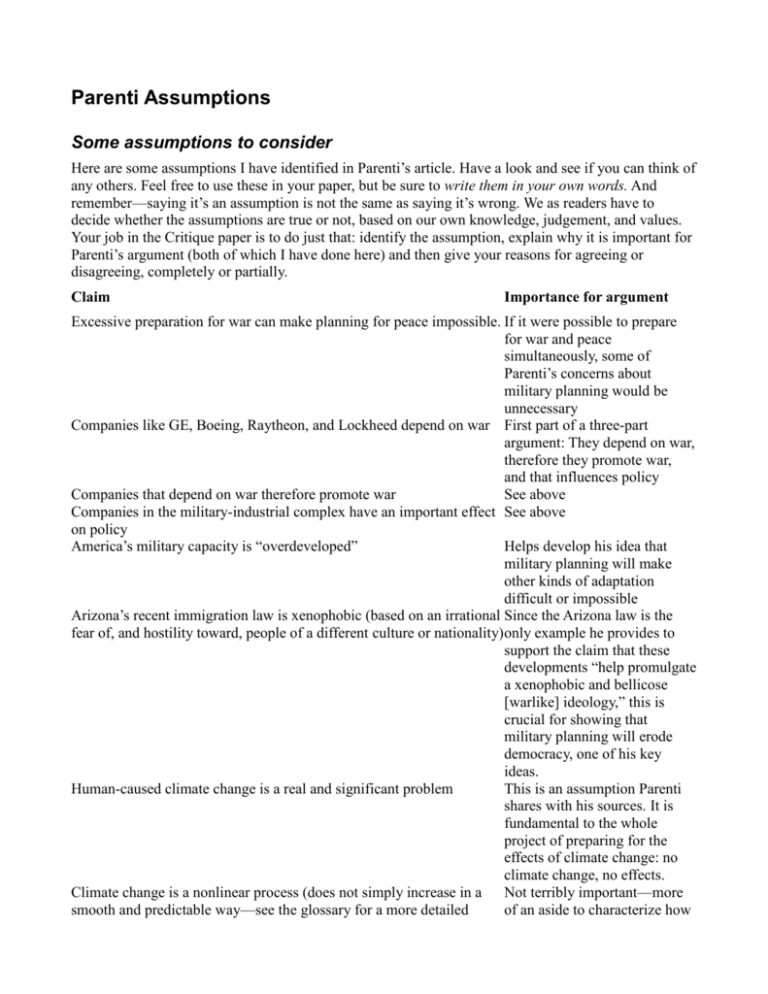
Parenti Assumptions Some assumptions to consider Here are some assumptions I have identified in Parenti’s article. Have a look and see if you can think of any others. Feel free to use these in your paper, but be sure to write them in your own words. And remember—saying it’s an assumption is not the same as saying it’s wrong. We as readers have to decide whether the assumptions are true or not, based on our own knowledge, judgement, and values. Your job in the Critique paper is to do just that: identify the assumption, explain why it is important for Parenti’s argument (both of which I have done here) and then give your reasons for agreeing or disagreeing, completely or partially. Claim Importance for argument Excessive preparation for war can make planning for peace impossible. If it were possible to prepare for war and peace simultaneously, some of Parenti’s concerns about military planning would be unnecessary Companies like GE, Boeing, Raytheon, and Lockheed depend on war First part of a three-part argument: They depend on war, therefore they promote war, and that influences policy Companies that depend on war therefore promote war See above Companies in the military-industrial complex have an important effect See above on policy America’s military capacity is “overdeveloped” Helps develop his idea that military planning will make other kinds of adaptation difficult or impossible Arizona’s recent immigration law is xenophobic (based on an irrational Since the Arizona law is the fear of, and hostility toward, people of a different culture or nationality) only example he provides to support the claim that these developments “help promulgate a xenophobic and bellicose [warlike] ideology,” this is crucial for showing that military planning will erode democracy, one of his key ideas. Human-caused climate change is a real and significant problem This is an assumption Parenti shares with his sources. It is fundamental to the whole project of preparing for the effects of climate change: no climate change, no effects. Climate change is a nonlinear process (does not simply increase in a Not terribly important—more smooth and predictable way—see the glossary for a more detailed of an aside to characterize how explanation). scientifically accurate the planners are The 2007 “Age of Consequences” report is the most “scientifically Not terribly important. Simply literate” report of those he discusses. characterizing the different reports. War is more likely in places that were colonized or dominated by the Helps Parenti show how European powers and the US (war “follows the history of imperialism military planning will harm the and the uneven development of capitalism on a global scale”) most vulnerable, those who have been made poor by the “uneven development” of capitalism. Underdeveloped nations in the “Gap” or “periphery” have been and Part of Parenti’s effort to show still are taken advantage of by the wealthy industrialized nations (they why military planning is are “not so much excluded … as … historically exploited and harmful, since it continues the politically subjugated”). pattern of exploitation. It will be impossible for the wealthy nations to protect themselves from Supports his argument that the conflicts caused by climate change. military solutions are not viable in the long run. Military planning will lead to racism, surveillance and repression. (He Part of showing why military actually has a longer list, including “xenophobia” and “militarism.” I solutions are not a good idea. think, though, that he tries to prove these two with examples such as the Arizona law—which he considers a xenophobic law—and the quotes, which he uses to prove the claim of militarism. So those are not assumptions, because he tries to prove them. But I do not see anywhere in the article where he tries to prove the idea of racism, surveillance or repression, so I would count these as assumptions.) Things to watch out for Confusing supported claims with assumptions Remember that an assumption is a claim the author does not even try to prove. So if Parenti offers any evidence at all—even if the evidence is insufficient, irrelevant, or unrepresentative—he’s still trying to prove the claim and so it is not an assumption. Here are a couple examples of claims that Parenti does try to support, and so are not assumptions: The development of the security industry, or what he calls the “new economy of repression,” encourages war-making and hostility toward immigrants (“helps promulgate a xenophobic and bellicose ideology”). The example of Arizona’s immigration law, and support for it by the private prison industry, is a piece of evidence to support this connection. Thus, even though he provides only one piece of evidence, he is still trying to prove the point. It is not an assumption. Barnett’s “Core” and “Gap” corresponds to the old division between the imperial powers and the nations they conquered (“in reality, this new map is just the old map—the geography of empire.”) By providing the examples of Wallerstein and Mill, he is trying to prove that the old geography is the same as what Barnett describes, so this is not an assumption. Parenti’s assumptions vs. his sources’ assumptions Since so much of Parenti’s argument is quotes from, or descriptions of, reports by other people, it’s important to distinguish between his assumptions and theirs. In some cases they overlap (for example, he and they both assume that climate change is real and that it will cause social and economic problems), but we still need to respect the difference between them. Here are a couple of assumptions from Parenti’s sources (the reports) that he does not share: “Once again, warfare would define human life.” This is what Parenti is hoping to avoid, as we see in his final paragraph. He believes that we can approach the problem differently, although he does not say much about that alternative. But he certainly does not assume that it is true. He believes that it is what is called a “self-fulfilling prophecy.” If we believe it and prepare too much for war we will make it come true. “Altruism and generosity would likely be blunted.” Here, too, this quote from one of his sources is directly contrary to what Parenti would like to see happen. We see this in the final paragraph when he advocates “greater cooperation and economic redistribution.” Cooperation and altruism are closely related, though not identical. The whole point of Parenti’s article is to say, “Look, this military planning is happening but it will create a future we don’t want.” The quote about altruism being blunted is part of the destructive path (as he sees it) the military planners are taking us down, not his view of the subject. Remember to read “Tips on Writing about Assumptions” (the last link in the Critique Paper section of the website) for more on how to do this part of the paper—and what not to do.
